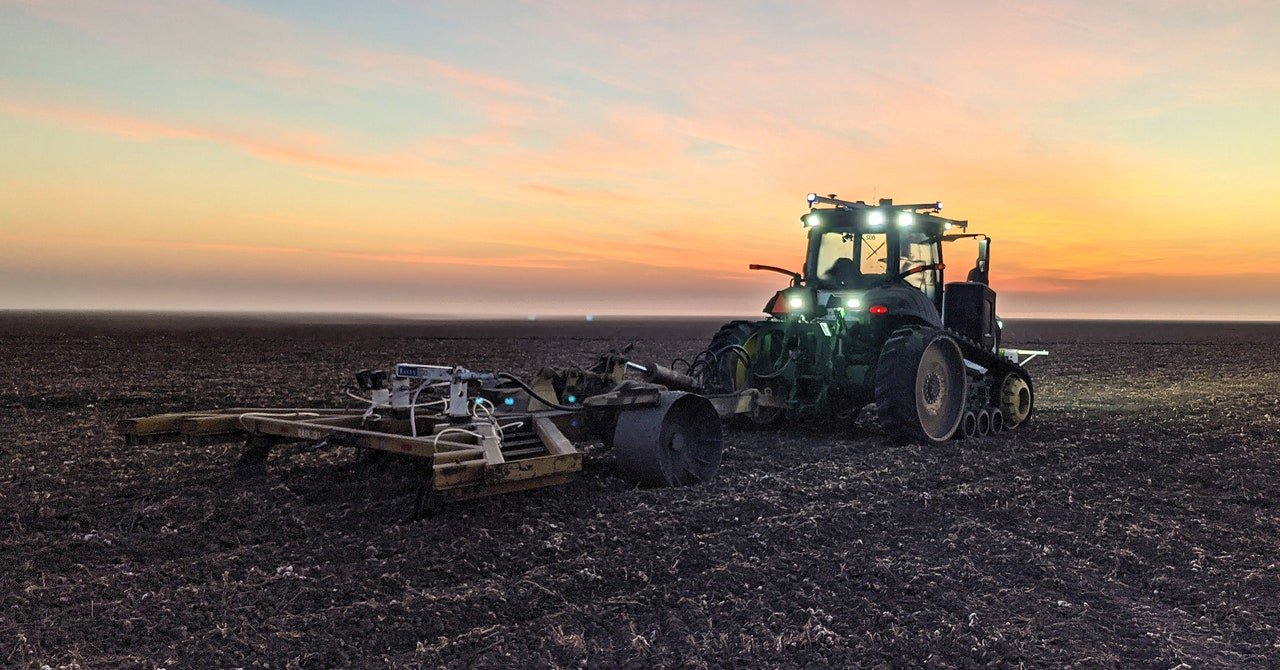There’s much talk about bringing more Silicon Valley-style innovation to America’s heartland. But when the heartland needs tech, it still comes to Silicon Valley.
John Deere Thursday said it would acquire Bear Flag Robotics, a Silicon Valley startup that makes fully autonomous tractors for farms, for $250 million.
Bear Flag retrofits regular tractors with sensors, control systems, computers, and communications systems needed to operate autonomously. The company’s tech lets a lone farmer remotely oversee a fleet of robot tractors autonomously tilling a field.
“John Deere putting their stamp on this kind of fully autonomous technology means it’s really coming,” says George Kantor, a roboticist at Carnegie Mellon University who specializes in use of robots in agriculture. He adds that autonomous tractors are especially important because the machines are used in so many different areas of farming.
Some tractors are already capable of following GPS-guided paths autonomously but Bear Flag’s tech removes a person from the tractor cab entirely. The company has borrowed innovations developed and commoditized through the self-driving car industry. It uses lidar and computer vision not only to navigate but also to analyze the soil behind a tractor.
“We use AI to analyze sensor input that predicts failure and can see beyond what a human can see,” says Aubrey Donnellan, cofounder and COO of Bear Flag Robotics.
The acquisition is the latest sign that John Deere, founded in 1837, sees automation, robotics, and artificial intelligence as crucial ingredients for the future of farming. The equipment manufacturer paid $305 million to acquire Blue River Technology, another Silicon Valley company that made intelligent weed-killing robots, in September 2017.
“For technologists interested in autonomous vehicle development and robotics, this is a field that is going to develop quite rapidly,” says Daniel Leibfried, director of autonomy and intelligent solutions at John Deere.
Machines have long been used in agriculture, but the industry is now experiencing a surge in new applications of automation as advances in AI and robotics allow processes to be automated in new ways. Many experts predict that more automation will be needed to meet rising demand for food amid challenges in finding labor, and to mitigate environmental damage that can come with more intensive farming.
On some farms, drones now autonomously analyze crops to estimate yields or spot signs of disease. A growing catalog of robots can perform more complex farmwork in the field, including machines that can harvest crops, remove weeds, and milk livestock. Startups such as Iron Ox and Bowery are developing greenhouses where food production is optimized using sensors, robotics, and AI.
Some simple work still remains out of robotic reach. Picking grapes or tomatoes, for instance, might be simple (and low-paid) work for humans, but it is extremely difficult for robots to master.
“Eventually there will be robots that do those kinds of things too,” Kantor says. “And they will need to either be towed by or integrated into the type of autonomous tractor that Bear Flag is making.”
Revenue from agricultural robots is expected to grow 19 percent annually between 2018 and 2026 to $16.6 billion, according to Research Drive, an analyst firm.
Increased agricultural automation could potentially affect employment. Farming still accounts for roughly 2.6 million US jobs, according to figures released by the US Department of Agriculture in October 2020.
But Ali Moghimi, an assistant professor at the University of California Davis who teaches “precision agriculture,” says robotics and AI are likely to be adopted more slowly in agriculture than other industries because of the complexity and the cyclical nature of farming. But he believes automation is inevitable not only because it can increase productivity but also because it can help limit environmental damage by, for instance, automatically detecting overuse of nitrogen fertilizer.
“Recent advances in AI are going to be a game-changer,” in farming, Moghimi says. “This is the path we have to go down.”
- 📩 The latest on tech, science, and more: Get our newsletters!
- Prisoners, doctors, and the battle over trans medical care
- The Olympics could be a Covid “super-evolutionary event”
- How to stay under your 15GB of free storage from Google
- Space Jam: A New Legacy and the fury of an AI scorned
- These bendy plastic chips fit in unusual places
- 👁️ Explore AI like never before with our new database
- 🎮 WIRED Games: Get the latest tips, reviews, and more
- 🎧 Things not sounding right? Check out our favorite wireless headphones, soundbars, and Bluetooth speakers

Leave a Reply
You must be logged in to post a comment.